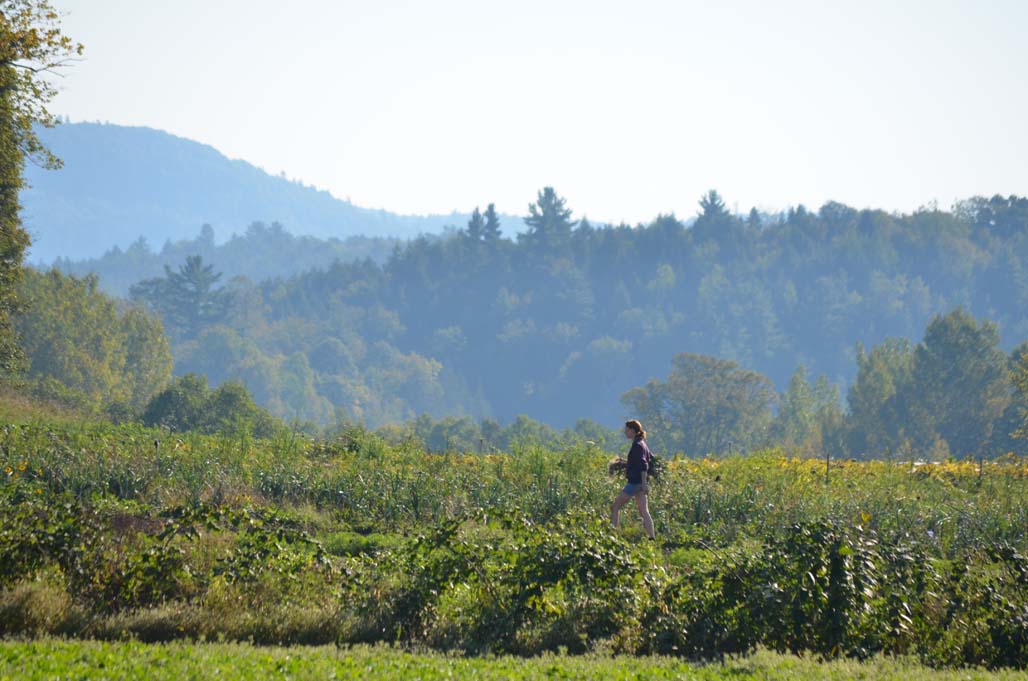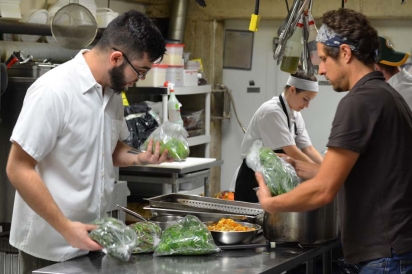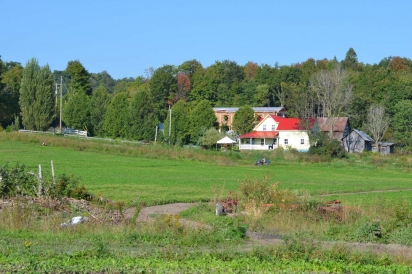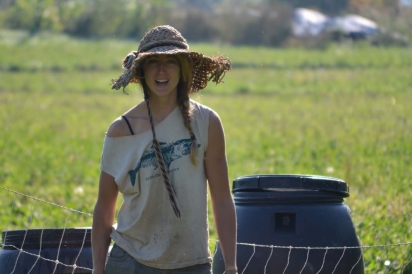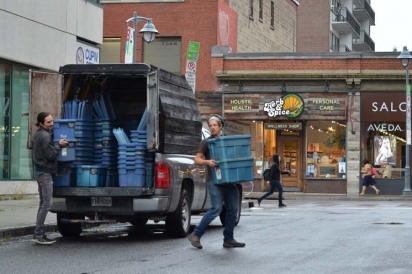Juniper Farm: Love, dirt and the pursuit of happiness
Some people listen to music. When given the opportunity, they go to concerts to hear songs that have affected them in one way or another, seeking a deeper and possibly more meaningful connection with the sound. Some people paint or draw. They admire the creations of others and subsequently learn about themselves in their own artistic expression. “Some people do these different things to experience life in a more meaningful way” says Alex Mackay-Smith, “For Juniper and I, it is the dining experience and the deep sensations this can evoke in our souls.”
On Juniper Farm, Alex Mackay-Smith and his wife, Juniper Turgeon, describe a relationship with food that goes deeper than what the eye sees and is more complex than what the hands can hold. It is a process of growing and consuming that opens possibilities. “Food is a language that everybody speaks,” explains Turgeon. “It is the link between connecting with nature and caring for ourselves and the earth.”
It is this experience of tasting the creations of outstanding chefs, using ingredients they have affectionately grown, that continues to inspire their farming practice. “Working with chefs is amazing because here you have two people coming together with a deep passion for creating. Juniper and I have a passion for making the canvas of this farm come alive. For chefs it is the passion on the plate,” Mackay-Smith says.
Juniper Farm currently delivers to 25 restaurants in a flurry of activity that oversimplifies the popular term “farm-to-fork.” Delivery days are a bustling production. A classroom-sized whiteboard mounted on the wall of the barn dictates a process that can easily send one’s head spinning. “Nobody else is allowed to take that place at the helm of the board,” Mackay-Smith says, only half joking.
Each week Mackay-Smith personally phones each of the chefs with whom they work. He records their orders on the board and the members of the farm team assume their duties in this well-oiled machine of harvesting and packing. Unlike many other producers and wholesalers, Juniper Farm does not insist on selling certain quantities of food. “A restaurant can purchase just one small bunch of scallions, if that is what they want,” he clarifies.
The food is harvested out of the earth in the morning and delivered the same afternoon. The harvesting team is still in the field just minutes before the trucks are loaded. Like any good tactical team, handheld radios are held for last-minute adjustments. There are many hands at work on this multigenerational farm. Mackay-Smith’s parents, Gwen and Sandy Mackay-Smith, work alongside their own grandchildren, six-year-old Shiloh and four-year-old Rafael. Turgeon and Mackay-Smith enjoy watching their sons integrate into a farm team that consists of fulltime staff, volunteers and CSA members who are working in exchange for a reduction on the cost of their Juniper Farm food delivery.
Again this year, Mackay-Smith will be doing the deliveries together with his father. “Dad loves the deliveries and building up the relationship with the people on the receiving end. He’s good at it, too!” They set off for a full day of driving, delivering and face-to-face conversations that build their connection with the chefs.
Mackay-Smith says, “The chefs say that the thing that blows their mind is that the food arrives and it’s still warm — because it has never gone in the fridge. They can feel the heat and smell of the farm coming from the vegetables. It offers them a glimpse out of their little stuffy kitchens — you can just see it on their faces.”
By the time this epic delivery run is complete, Mackay-Smith is ready for a meal. It is the biggest day of their week and he claims, “the treat of a dinner from one of the fantastic chefs we work with was already in the back of my mind before the sun had even risen. I love seeing what the chefs are making with our food.” Working with these talented chefs is a rewarding experience because they consistently honour the taste and the vitality of the food over anything else.
Combined with the pleasures of dining, eating out has an educational component. It helps Mackay-Smith understand the restaurants he serves and how the food he provides is being used. He makes a point of eating at a different restaurant each week and because Tuesday dining is less popular, he enjoys more extensive conversations with the chefs. “Every dinner I go to I learn something. Something will stick in the back of my mind, then I’ll make a crop change according to what I have learned.” This has such a powerful effect that some crops are grown specifically for the restaurants they serve.
With a satisfied appetite and inspired new directions for growth, Mackay-Smith returns to Juniper Farm to rise at 5 a.m. the next day and go through a similar though slightly less urgent process to prepare and deliver CSAs and retail produce.
The 5 a.m. jolt of farm life is not something Turgeon and Mackay- Smith grew up with. The idea to become farmers came to this duo through an evolution, a process that first began in small backyard gardens in Toronto. The couple met at a Seedy Saturday event and bonded over a mutual desire to grow and share food that would nourish the bodies, souls and the very earth from whence it came. Turgeon was working in environmental education for youth and Mackay-Smith, who originally worked in ecological restoration, found himself increasingly interested in food as he explored various jobs cooking in tiny kitchens.
“I began working with food in these kitchens and kept wanting to dig deeper and understand more about the food itself. I found myself questioning the root of things. I’d be holding, say, a flower and would question the flower: how it was made and how it made it to my hands.” The drive to find the source is what brought him to farming and it didn’t take long for Turgeon’s green thumb to crave more earth.
These two peas needed better soil on which to sow their dreams. They learned everything they could about farming and eventually tilled their own soil on a 10-acre property in Wakefield. “The learning curve was steep,” says Turgeon. Mackay-Smith agrees, “The first seven years were nuts. You make mistakes and you can’t run to anybody. There’s no one to blame. You just have to figure it out.”
The two reflect on how city life and current education systems don’t teach the level of problem-solving skills and resourcefulness that is required to survive on a remote farm. Heat, hydro, septic, water — everything is taken for granted. “Out there, everything is more cowboy,” Mackay-Smith says.
Only time and a growing understanding of the seasons will tackle the climb. “Observation and experience are the best teachers,” says Turgeon. Farming is unique — it takes a full year to watch a mistake. “You have to look at your mistake every single morning for a full season before you get to correct it.” They reminisce about planting onions too closely and gambling on frosts. Their serenity is enviable.
After five years on the 10-acre plot and a more developed understanding of organic and sustainable farming practices, they realized they were starting to outgrow the space. “We had dreams of expanding — not necessarily growing more vegetables — which we do — but mostly of expanding into the public realm. We started asking, ‘What can we do to get more people up to the farm?’”
Today Juniper Farm occupies 200 acres north of Wakefield, Québec. It offers organic, biodynamic produce to CSA members, it recently started home deliveries and provides ample products to high-end restaurants in the Ottawa-Gatineau region. The family dwelling has swelled as well. The couple built a beautiful home made of rammed earth and upcycled beams from their old barn, since torn down. They welcomed Mackay-Smith’s parents into the house, much to the pleasure of Shiloh and Rafael who love seeing their granny and granddad everyday. “We are kind of like a multigenerational farm in reverse,” explains Mackay-Smith. The new living arrangement was actually Turgoen’s idea. She affirms, “It’s a huge relief to have other adults in the house, they help us and we help them.”
Their previous dwelling, the sunshine-yellow farmhouse, gleams brilliantly; the candy-red tin roof beckoning any passer-by to stop. Inside, the room is full of zeal as electric saws cut through wood with loud snarls. Mackay-Smith and Turgeon eagerly lead the way through a space in the midst of a transformation. Mackay-Smith ’s voice is barely audible, “This was once our home, we used to dine right here,” he points to the wrap around porch, “and now we’re opening it right up!” His arms extend almost as wide as the smile on his face.
The quaint farmhouse is being “opened up” in every sense of the word. On May 15th, the family will host the grand opening of their farm store, complete with a commercial kitchen. “It will be like a 100-mile local-food hub” explains Juniper. The store will sell all of Juniper Farms products as well as a variety of foods from neighbouring farms.
The commercial kitchen will allow them to further develop their products and food lines using ingredients straight from the farm. Currently, they offer five flavours of sauerkraut and make fermented beets. The sauerkraut is also available at numerous retailers throughout Ottawa-Gatineau, including Herb and Spice, Whole Foods and Pippolina Bakery. When the kitchen is ready, they plan to do small batches of more unique, gourmet ferments.
All of this serves to fulfill one important vision Turgeon and MacKay-Smith has for their homestead: to share their space and their bounty with a larger community. Mackay-Smith reflects, “Imagine if people could come and sit out here on the a porch, buy some fresh food and have a picnic looking out over the farm.”
Mackay-Smith and Turgeon's rubber boots squelch down a mucky path towards the spot where chickens have been happily overwintered. A rooster crows loudly as Turgeon lifts a corner of the fencing for a wandering chicken to find her way back to the flock. Mackay- Smith explains that soon the chickens will move from this spot and become a part of a rotation, taking part in a system that nourishes the animals and the land.
Every animal on the farm plays an important role in the growth of food. Based on the practice of biodynamics, Mackay-Smith explains how the cycle, within which animals eat and fertilize soil, feeds the farm in countless ways. “It creates a beautiful rhythm on the farm,” explains Mackay-Smith. Everything on the farm matters — right down to the vegetables, the pastures, the animals and the eggs. They each have an important role in one another’s mutual growth and development.
“Plants that are growing are so much more than just what we see on the surface. They contain knowledge about the deeper soil, the essence of the terroir — something we can’t even fully understand. There are still a lot of mysteries about soil that scientists have yet to uncover,” says Mackay-Smith.
Being biodynamic means the farm feeds itself, with no external inputs. Turgeon explains, “Practising farming this way means that you are always trying to bring your farm back to a holistic state. It’s like a healing process in the hope that the evolution of the farm will get back to its original, dynamic state. Of course, every year you will see variations of how that’s working.”
Deep work has gone into the food created here. Everything is interconnected and the result is foods that are not only nutrient dense, but that have been enlivened by the farmer — something that goes beyond the fruit you can see with your eyes.
While farming theories and practices are unique to every farm, the relationships that Mackay-Smith and Turgeon have developed and maintained with neighbouring farms is admirable. They have solid friendships with a long list of fellow farmers at Le Coprin, Ferme et Forêt, Roots and Shoots Farm, Ferme Lève-Tôt, Älska Farm and Ivan Hale, to name a few. They regularly collaborate with all of them to increase direct marketing of all their products. In fact, CSA shareholders are able to top up their food boxes with selections from some of Juniper Farm’s collaborators. Juniper Farm is committed to buying their food at the price they want to sell it. “We are trying to be both collaborative and ethical," Turgeon explains. Community is important to Mackay-Smith and Turgeon. It is obvious in everything they do: from the way they involve their neighbours and befriend customers and chefs, to how they lovingly include their family on the farm.
Today, the air has a dampness that announces spring is around the corner. Nevertheless, the poplar trees have yet to release their signature smell that Mackay-Smith and Turgeon have come to fervently associate with the beginning of their chaos. “Spring means something different for us famers,” Mackay-Smith explains. Reflecting on their life and personal growth on the farm, they both share descriptions of past anxieties — the tribulations of early farm life.
They paint a serene portrait as they discuss the upcoming season, it occupies their thoughts, but still grants them time to breathe. Meanwhile, birds are flocking to the many feeders they have placed around the new house. They know where to find food and grace them with songs of thanks.
Juniper Farm
375 Shouldice Rd., La Pêche, Qué.
juniperfarm.ca, 819.459.1630


